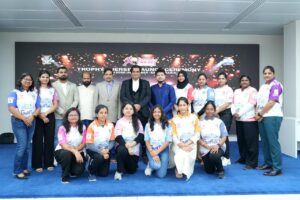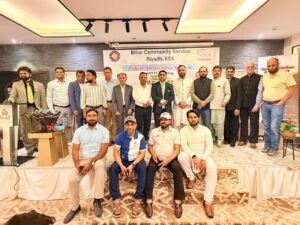
By Dr. Sameera Aziz
The Asia Cup 2025 clash between India and Pakistan, held on Sunday, September 14, at the Dubai International Cricket Stadium, was far more than just another cricket match. It was the first meeting between the two nations since their four-day military conflict in May 2025 — and in that charged context, the game carried significance well beyond the scoreboard. It became a test of whether sport, and cricket in particular, can offer what politics often cannot: a channel for empathy, a stage for respect, and a symbol of dialogue.
A Match Beyond the Numbers
On the field, India secured a convincing seven-wicket victory. Pakistan posted 127/9 in their 20 overs, with resilient knocks from Sahibzada Farhan (40) and Shaheen Shah Afridi, supported by disciplined spells from India’s Kuldeep Yadav and Axar Patel. In response, India chased down the target with 4.1 overs to spare, powered by Suryakumar Yadav’s unbeaten 47 and aggressive starts from Abhishek Sharma and Tilak Varma.
Yet while India celebrated and Pakistan reflected, the larger victory was that the game happened at all. Against calls for boycotts and political pressure, both nations took the field. That decision itself sent a message: cricket does not have to be cancelled by conflict.
Why Cricket Diplomacy Matters
Sports diplomacy — and cricket diplomacy in particular — matters because it operates on emotional ground. When India and Pakistan face each other in cricket, millions of fans across borders experience the same waves of joy, heartbreak, anxiety, and anticipation within the same hours. These synchronized emotions generate empathy.
A Pakistani wicket may bring cheers in Delhi and despair in Lahore, but a fine Pakistani cover drive may also draw nods of appreciation from Indian fans. Likewise, an Indian six soaring into the stands can ignite excitement across Mumbai, but it also earns recognition from cricket lovers in Karachi. In these fleeting moments of admiration, politics loses its monopoly on how people perceive “the other.” Walls built by rhetoric begin to show cracks of compassion.
Unlike traditional diplomacy, which is often slow and constrained by mistrust, cricket diplomacy is immediate and human. It offers a neutral stage where citizens and governments can connect indirectly, bypassing the heavy baggage of statecraft.
Symbolism That Resonates
The symbolic gestures that follow a match — handshakes, congratulatory pats, or even the acknowledgment of an opponent’s brilliance — carry meaning far beyond the boundary rope. They send subtle but powerful signals to millions watching on television or online.
Even controversial incidents, such as a handshake refused, spark discussions about respect and sportsmanship. They reveal what fans expect: dignity, fairness, and humanity. Symbols matter in diplomacy, and sport provides them in abundance.
The Role of Media as Bridge Builders
Here, the media carries immense responsibility. If journalists and broadcasters focus only on nationalist outrage, they inflame division and deepen animosity. But when they highlight shared applause, mutual respect, and the joy of fair play, they shape public perception toward peace.
Media stories should not only report who won and lost, but also emphasize the moments of sportsmanship: when a bowler helps a batsman up after a fall, when a crowd claps for an opponent’s skill, when captains share words of encouragement. These images become emotional bridges, reminding audiences that beyond politics, humanity persists.
The media can and should guide fans to see opponents as fellow athletes, not enemies. In doing so, they nurture a mindset where rivalry stays on the pitch and respect travels beyond it.
Lessons from September 14
The Dubai match showcased several qualities that underline the value of cricket diplomacy:
- Courage to Play Despite Tensions: Despite political pressure, the boards allowed the game to proceed. That alone was an act of courage.
- Performances Transcending Politics: Both Indian and Pakistani players had moments of brilliance, reminding fans that skill has no nationality.
- Global Audience Engagement: The match drew millions of viewers worldwide. Social media amplified reactions across continents, weaving together narratives of shared passion.
These attributes underline how cricket can function as a form of people-to-people diplomacy — fast, emotional, and highly visible.
Guiding Public Mindset Toward Peace
If cricket is to truly contribute to peace, public opinion must be nurtured in the right direction. This requires a conscious effort:
- Celebrate mutual success: Acknowledge an impressive Pakistani inning with the same sincerity as an Indian knock.
- Encourage sportsmanship: Fans should hold banners reading “Respect for All” rather than trading insults.
- Promote positive commentary online: Social media can be a platform for encouragement rather than hostility.
Public mindset is one of the most powerful forms of soft power. When millions of citizens choose empathy over anger, they pressure governments to soften their stances, open cultural and sporting exchanges, and prioritize peace. When the majority views the “other side” as human, the concept of war loses its appeal.
A Handshake of Possibility
Yes, India defeated Pakistan in Dubai on September 14, 2025. But the greater victory lay not in the runs scored or wickets taken, but in what the match represented: a handshake of possibility, a scoreboard of hope. Cricket diplomacy does not erase the complexities of politics, but it softens the edges. It opens a door where hearts begin to speak before swords are drawn.
The challenge now lies with media, institutions, and the fans themselves. If they highlight respect, celebrate shared successes, and demand sportsmanship, then every India-Pakistan match can be more than a contest. It can be a reminder that peace is possible — that rivalry need not mean hostility, and that humanity can still triumph over division.
Cricket may not singlehandedly resolve political disputes. But it can plant seeds of empathy that make dialogue easier and hatred harder to sustain. And in the long arc of history, those seeds may prove more powerful than we imagine.
About the Author:
Dr. Sameera Aziz is a senior Saudi journalist, businesswoman, author, poet, and cross-cultural commentator based in Jeddah. Holding a PhD in Mass Media, she is one of the pioneers of female journalism in Saudi Arabia and a strong advocate for Vision 2030. She can be reached at: Consultant.sameera.aziz@gmail.com





